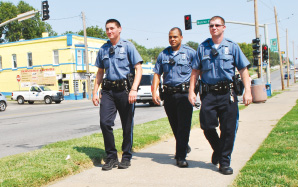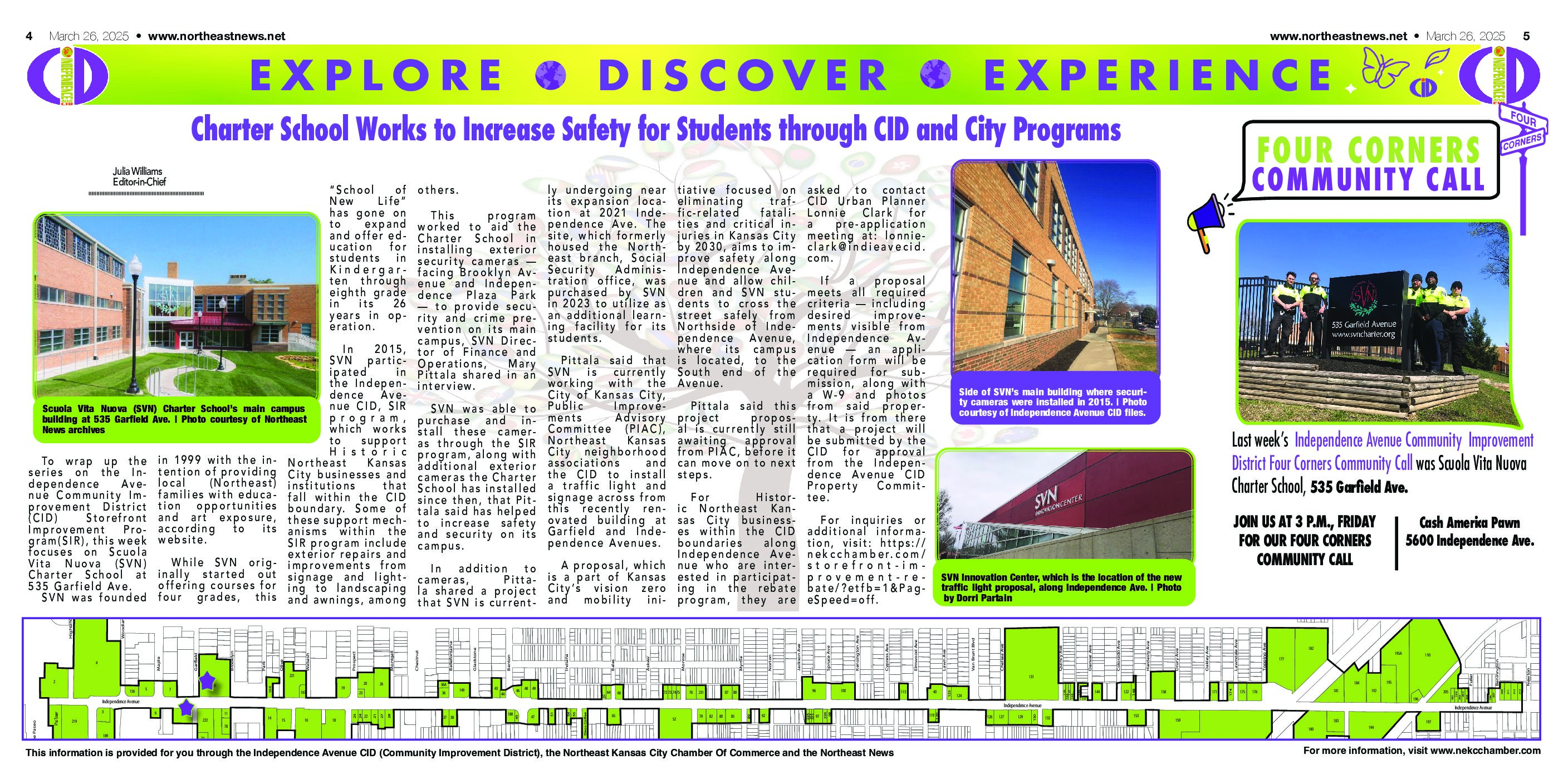
By Leslie Collins
Northeast News
September 21, 2011
Foot patrol officers in Northeast still haven’t counted the number of miles they’ve walked along Independence Avenue.
To them, miles don’t matter. They’re focused on reducing crime and forming relationships.
Rookie officers Vito Mazzara, Jonathan Cook and John King are among the first to participate in Kansas City Police Department’s foot patrolling pilot project, which began Aug. 1 and will continue through Oct. 31. KCPD launched the project in four of Kansas City’s most crime ridden areas with the goal of reducing crime and forming relationships with citizens.
Record breaking temperatures greeted the officers the first month and their polyester/cotton uniforms only intensified the stifling heat. But, they took frequent water breaks and cooled off inside area businesses.
“The heat was the only obstacle,” King said.
For an inside look, Northeast News joined the officers along their route toward the end of August. Cook, who normally foot patrols Prospect Avenue to Benton Boulevard and 25th Street to 28th Street, joined King and Mazzara for the day since his partner was sick.
“I was really excited,” King said of learning about his foot patrol role. “Whenever you’re on patrol, you’ll go from call to call and you won’t actually notice a difference.
“It’s really nice being out here because you notice what you’re doing is making a difference and impacting people’s lives and I think that’s awesome.”
“Our first two weeks out here, there was a lot more stopping people, criminal activity, drug dealing, prostitution,” Mazzara said. “This is our fourth or fifth week now and it’s died down a lot.”
The three named businesses and street corners where drug dealers and prostitutes frequented. With foot patrolling, that’s changed and area businesses are noticing.
“I find it really helpful and awesome that they’re walking around,” 7-11 Cashier Lindsey Gruka said. “Usually on a normal business day I’d get asked for change, for drugs, to get into a car to be a prostitute – and I’m wearing my 7-11 uniform!
“Since they’ve come here, a lot of the vagrancy and crime has gone down. I can see a big difference.”
To show their appreciation, 7-11 gives the officers free drinks, as do a number of other businesses.
For Vicki LaBruzzo of Spalitto’s Pharmacy, having extra patrol has calmed her nerves.
“I feel more secure here,” she said. “Because I’m dealing with prescriptions and the avenue, it’s (foot patrolling) a good thing to have.
“Everybody seems to be very pleased (with the foot patrolling). I haven’t seen the panhandlers and stuff around here, which is a good thing.
“The neighborhood has changed.”
As the three officers continued their route, sweat dripped from their brow, but they didn’t complain. Their steady gait oozed a humble confidence and they greeted several pedestrians by name.
One woman pulled over her vehicle to ask for directions to a nearby funeral home and one of the officers looked up the address on his cell phone. Citizens asking for directions isn’t uncommon, Mazzara said.
A number of vehicles honked as they drove by and those inside waved with a big grin.
Community support has been overwhelming, Cook said.
The only complaint he’s heard has been, “‘I can’t sell my drugs here like I used to or I can’t be a prostitute here anymore,'” Cook said. “I’ll take those kind of complaints.”
Typical day
From mid-morning to early evening, Cook, Mazzara and King walk the streets five days a week. A second set of officers work the night shift.
Before walking the avenue, Mazzara and King will drive along their route and note where people have migrated to, which helps them plan where to start for the day.
In addition to conversing with pedestrians and those hanging out along Independence Avenue, the officers also socialize with area business owners and employees.
To date, the most common arrests have included public intoxication and trespassing.
“With drug dealers and prostitutes, you have to catch them in the act, which is difficult to do,” King explained.
Those on the street have developed strategies like clapping to warn their comrades when the officers are nearing, King said.
But, people are also clapping and whistling to gain the attention of police officers when a prostitute is rounding the corner, he added.
“So, we’ve got some help, too, from the people who live out here,” King said.
Through foot patrolling, the officers have met numerous people and have moved beyond surface level conversations.
They know the homeless and prostitutes by name. They know their life stories, their struggles.
“A lot of people will tell you this (Independence Avenue) is their home now,” King said. “Our friend Ivan, he’d talk to us for several hours if he could.”
In one instance, Ivan was instrumental in helping the officers locate a prostitute they were worried about.
“It’s kinda crazy because I can guarantee you if we were just on patrol and pulled up and said, ‘Hey, do you know who this person is?’ He’d be like, ‘Nope. I’m not telling you guys,'” King said. “This (foot patrolling) sheds a different light on what we do. People are more inclined to talk to us.”
Time for another rehydration break, the officers walked into the nearby BP gas station. The clerk greeted them with a friendly smile and said, “Take more breaks. It’s hot outside!”
Asked about their goals for foot patrol, all three said they wanted to reduce drug dealings and prostitution. Mazzara added he’d like to continue seeing a positive change along Independence Avenue even on his days off or when the project has ended.
“When we’re not here and to know we’re still making a difference,” Mazzara said.

















